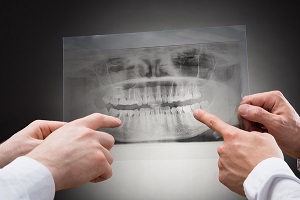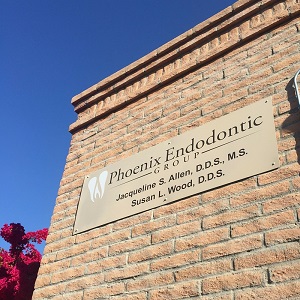
by Dr. Jacqueline S. Allen | May 27, 2016 | Blog, Business, Dentistry, Endodontics, Endodontist, Mission of Mercy
 Team members of Phoenix Endodontic Group participated in the 2016 HopeFest event which took place April 15th-16th at CHASE Field in Phoenix. This annual event provides a wide range of sevices to the homeless and economically challenged members of our community. The Central Arizona Dental Society Foundation was asked to help deliver the dental services at HopeFest over a two day period.
Team members of Phoenix Endodontic Group participated in the 2016 HopeFest event which took place April 15th-16th at CHASE Field in Phoenix. This annual event provides a wide range of sevices to the homeless and economically challenged members of our community. The Central Arizona Dental Society Foundation was asked to help deliver the dental services at HopeFest over a two day period.
“This was such a great and it took many wonderful volunteers to make it a success,” said Dr. Jacqueline S. Allen, CADSF Board President. “We were thankful to have dental teams come together to help get folks smiling again.” Allen continued, “Several team members from offices across the Valley volunteered over the two day period.” The following team members from Phoenix Endodontic Group participated: Dr. Jacqueline Allen (Clinic Floor Director), Dallas Hedges (Endodontic Lead), Roxann Naithani (Patient Registration Lead) Hanh Duong (Patient Exit), Savannah Allen (X-Ray) and Kevin Conroy (Event Director).
 Dr. Allen also wished to thank members of the Phoenix Endodontic Group’s extended “family” for their amazing efforts: Kristen Kingsley (Event Coordinator), Sarah Tate (Event Coordinator), Linda Shirey (Volunteer Lounge) and Dr. Carol Ford (Dental Routing).
Dr. Allen also wished to thank members of the Phoenix Endodontic Group’s extended “family” for their amazing efforts: Kristen Kingsley (Event Coordinator), Sarah Tate (Event Coordinator), Linda Shirey (Volunteer Lounge) and Dr. Carol Ford (Dental Routing).
Highlights from the 2-day dental clinic include: $397,000 in free dental care delivered to 369 patients. CADSF was also able to provide dentures, root canals and crowns – these services were all provided for the first time ever at HopeFest.
Thanks to the Central Arizona Dental Society Foundation and all of the volunteers for making 2016 HopeFest a big success.


by Dr. Jacqueline S. Allen | May 18, 2016 | Blog, Dentistry, Endodontics, Endodontist
 While public awareness campaigns in recent years have highlighted the role of endodontists in dental care, the first time many patients see the way that general dentists work with endodontists is when their family dentist makes a referral to one because they need a root canal treatment or a related procedure.
While public awareness campaigns in recent years have highlighted the role of endodontists in dental care, the first time many patients see the way that general dentists work with endodontists is when their family dentist makes a referral to one because they need a root canal treatment or a related procedure.
There are several key ways in which general dentists and endodontists work together, and understanding the professional relationship that exists between the two groups of practitioners can help dental consumers better appreciate how their treatment is being delivered.
Ways In Which Dentists And Endodontists Work Together
- Making referrals. General dentists refer the most difficult cases of infected or compromised teeth to endodontists, who are specialists in the speedy resolution of such cases and experts in pain management.
- Consultations. When a general practitioner is delivering treatment, but needs additional insight on how to approach a root canal, he or she will turn to an endodontist, who can advise him or her on the best way to treat the patient.
- Serving as partners in the healing process. Because a patient may only see an endodontist at most a few times, communication between the specialist’s office and a patient’s general provider is crucial. At Phoenix Endodontic Group, referring dentists have full online access to a patient’s records, so he or she will have a convenient way to view treatment results from the endodontist’s office when the patient returns for further oral health evaluations.
“Endodontists rely on general dentists for referrals, crucial steps in the root canal treatment process, and so much more,” says Dr. Allen, who practices with the Phoenix Endodontics Group. We make every effort to make the treatment experience efficient for the practitioner and seamless for the patient.”

by Dr. Jacqueline S. Allen | Apr 18, 2016 | Blog, Business, Endodontics, Endodontist, Phoenix Endodontic Group
 The entire team at Phoenix Endodontic Group has a keen awareness that we are here to provide gentle and individualized care to all patients entrusted to us by our referring doctors or that have sought us out on their own. There are many endodontic specialists in the Valley, and we realize that we must always “be at our best” relative to patient care.
The entire team at Phoenix Endodontic Group has a keen awareness that we are here to provide gentle and individualized care to all patients entrusted to us by our referring doctors or that have sought us out on their own. There are many endodontic specialists in the Valley, and we realize that we must always “be at our best” relative to patient care.
Understanding what patients are seeking when they come to our office helps us be able to define what sets us apart from other endodontic specialists.
- Patients want to be treated with the state of the art equipment – Phoenix Endodontic Group consistently makes investments in technology and training to be able to deliver the best in modern endodontic therapy to our patients.
- Patients want their endodontist to listen to their concerns and fully answer their questions relative to treatment options – Phoenix Endodontic Group is the only endodontic practice in the Phoenix/Paradise Valley area with all-female practitioners. Dr. Jacqueline Allen and I have many years of experience and training treating patients with endodontic pain. We take our time with consultations and develop a treatment plan with the patients best interests in mind.
- Patients need access to care when they are experiencing pain and discomfort. No one can predict when the need for a root canal will arise. Phoenix Endodontic Group has two conveniently located offices that are open Monday – Friday from 7:00am – 5:00pm on most days.
At Phoenix Endodontic Group we live by a simple rule – Treat our patients the way we wish to be treated when we receive care. Living by this rule has help to make us one of the top endodontic specialty offices in the Phoenix/Paradise Valley area.

by Dr. Jacqueline S. Allen | Apr 11, 2016 | Blog, Endodontics, Endodontist, Root Canal
 As a practitioner of general dentistry, it’s your goal to provide quality service to your patients, even in the most challenging clinical circumstances. Sometimes, that means referring a patient to be treated by a dental specialist.
As a practitioner of general dentistry, it’s your goal to provide quality service to your patients, even in the most challenging clinical circumstances. Sometimes, that means referring a patient to be treated by a dental specialist.
For cases in which a natural tooth is threatened by infection or injury, the Phoenix Endodontic Group should be at the top of your dental referral list. Patients needing root canals, apicoectomies, or related procedures will benefit from the clinical expertise of the dentists at Phoenix Endodontic Group.
- Endodontists have two to three additional years of specialized training beyond dental school, focusing specifically on the treatment of tooth root disorders.
- Endodontists have a higher daily volume of clinical experience with procedures such as root canals — some average as many as 25 root canals per week.
- Endodontists have access to cutting-edge tools and microsurgical techniques, making the process safe and effective for patients.
- Endodontists are specialists in pain management and complex cases, with significant experience in saving highly damaged or severely infected teeth.
You may especially want to consider making a referral if you have a case that involves:
- The inclination or rotation of a tooth
- l Tooth roots or canals that are curved
- l Radiographs of the tooth that indicate the presence of a pulp stone in the canals
- l A tooth with a post or a crown
“General practitioners are held to a specialist’s level of care, so it’s important to have a strong referral network when you encounter a complex or challenging case,” says Dr. Allen of the Phoenix Endodontic Group. “Our practice specializes in difficult-to-treat cases. You’ll look good for referring them, and your patient will feel good after the procedure.”

by Dr. Jacqueline S. Allen | Mar 8, 2016 | Blog, Endodontics, Endodontist, Root Canal
 No matter how permanent something seems in our lives, the element of change is always in play. Telephones have evolved from a device affixed to a wall that had us shouting into a large funnel to send our voice across the wires, into today’s “smartphones” that are basically tiny computers that fit in our pockets. We’ve transformed exercise gyms from places with vibrating motor-driven belts that jiggled our waists and thighs to slick suites offering Bikram “hot” yoga and Pilates.
No matter how permanent something seems in our lives, the element of change is always in play. Telephones have evolved from a device affixed to a wall that had us shouting into a large funnel to send our voice across the wires, into today’s “smartphones” that are basically tiny computers that fit in our pockets. We’ve transformed exercise gyms from places with vibrating motor-driven belts that jiggled our waists and thighs to slick suites offering Bikram “hot” yoga and Pilates.
Root canals – one of the key procedures used by endodontists to save weakened or infected natural teeth – have also evolved. The American Association of Endodontists showcase this progression during Root Canal Awareness Week, which this year will be observed from March 27 to April 2. The week casts a spotlight on how the root canal procedure has changed over the years and why endodontists are the best equipped providers to perform it.
Facts About Root Canals and Endodontists
- More than 15 million root canals are performed each year in the United States.
- Eighty-nine percent of patients who receive root canals from endodontists say that they are satisfied with the results they received.
- As root canal specialists, endodontists receive two to three extra years of training beyond dental school, and typically perform 25 root canals per week, compared to an average of less than two root canals performed each week by general dentists.
- Endodontists have the following advantages when they perform a root canal procedure: access to advanced equipment, knowledge of microsurgical techniques, and a professional focus on saving natural teeth and diagnosing and treating tooth pain.
“Family physicians turn to medical specialists, such as cardiologists and podiatrists, when their patients have serious health issues,” says Dr. Allen, an endodontist who practices with the Phoenix Endodontic Group. “General dentists turn to endodontists when your natural tooth needs to be treated with a root canal.”

by Dr. Jacqueline S. Allen | Feb 10, 2016 | Blog, Endodontics, Endodontist, Root Canal
 Having a root canal treatment is one big step toward saving an infected or damaged tooth. However, the root canal procedure itself, which has a 95 percent success rate, is only the beginning of the treatment process. There are several steps you can take – some immediately after your root canal and some over the long run – to ensure your tooth heals properly.
Having a root canal treatment is one big step toward saving an infected or damaged tooth. However, the root canal procedure itself, which has a 95 percent success rate, is only the beginning of the treatment process. There are several steps you can take – some immediately after your root canal and some over the long run – to ensure your tooth heals properly.
Caring For Your Teeth After A Root Canal
- Post-operative care. Immediately after the treatment, don’t bite down or chew with the treated tooth. You can manage discomfort with over-the-counter pain medication and by applying an ice pack to your face for 10 minutes every 20 minutes to reduce swelling. Return to your endodontist if discomfort persists or your original symptoms return.
- Taking prescribed medications. It is critical that you take all medications that may have been prescribed by your endodontist after your treatment.
- Dental restoration. Make an appointment with your general dentist around two weeks after your root canal so he or she can place a crown on the treated tooth to protect it from reinfection. A crown can also provide important support to the compromised tooth’s structure.
- Periodic endodontic appointments. Don’t skip follow-up visits to your endodontist after your restoration is in place. Your endodontist will examine the root canal by using X-rays and other assessment tools to make sure there are no signs of infection and to monitor healing.
- Good oral hygiene. You can keep your restored tooth healthy by brushing your teeth twice a day, flossing daily, and getting dental cleanings regularly.
“Some patients think their root canal is finished once they leave their endodontist’s chair,” says Dr. Allen, who practices with the Phoenix Endodontic Group. “But the treatment is a process, not an event. Following your aftercare instructions is crucial.”

 Team members of Phoenix Endodontic Group participated in the 2016 HopeFest event which took place April 15th-16th at CHASE Field in Phoenix. This annual event provides a wide range of sevices to the homeless and economically challenged members of our community. The Central Arizona Dental Society Foundation was asked to help deliver the dental services at HopeFest over a two day period.
Team members of Phoenix Endodontic Group participated in the 2016 HopeFest event which took place April 15th-16th at CHASE Field in Phoenix. This annual event provides a wide range of sevices to the homeless and economically challenged members of our community. The Central Arizona Dental Society Foundation was asked to help deliver the dental services at HopeFest over a two day period. Dr. Allen also wished to thank members of the Phoenix Endodontic Group’s extended “family” for their amazing efforts: Kristen Kingsley (Event Coordinator), Sarah Tate (Event Coordinator), Linda Shirey (Volunteer Lounge) and Dr. Carol Ford (Dental Routing).
Dr. Allen also wished to thank members of the Phoenix Endodontic Group’s extended “family” for their amazing efforts: Kristen Kingsley (Event Coordinator), Sarah Tate (Event Coordinator), Linda Shirey (Volunteer Lounge) and Dr. Carol Ford (Dental Routing).


 While
While 

 As a practitioner of general dentistry, it’s your goal to provide quality service to your patients, even in the most challenging clinical circumstances. Sometimes, that means referring a patient to be treated by a dental specialist.
As a practitioner of general dentistry, it’s your goal to provide quality service to your patients, even in the most challenging clinical circumstances. Sometimes, that means referring a patient to be treated by a dental specialist.
 No matter how permanent something seems in our lives, the element of change is always in play. Telephones have evolved from a device affixed to a wall that had us shouting into a large funnel to send our voice across the wires, into today’s “smartphones” that are basically tiny computers that fit in our pockets. We’ve transformed exercise gyms from places with vibrating motor-driven belts that jiggled our waists and thighs to slick suites offering Bikram “hot” yoga and Pilates.
No matter how permanent something seems in our lives, the element of change is always in play. Telephones have evolved from a device affixed to a wall that had us shouting into a large funnel to send our voice across the wires, into today’s “smartphones” that are basically tiny computers that fit in our pockets. We’ve transformed exercise gyms from places with vibrating motor-driven belts that jiggled our waists and thighs to slick suites offering Bikram “hot” yoga and Pilates.
 Having a root canal treatment is one big step toward saving an infected or damaged tooth. However, the root canal procedure itself, which has a 95 percent success rate, is only the beginning of the treatment process. There are several steps you can take – some immediately after your root canal and some over the long run – to ensure your tooth heals properly.
Having a root canal treatment is one big step toward saving an infected or damaged tooth. However, the root canal procedure itself, which has a 95 percent success rate, is only the beginning of the treatment process. There are several steps you can take – some immediately after your root canal and some over the long run – to ensure your tooth heals properly.